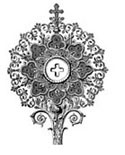
At the Closing of the Year of the Eucharist
HAS ANYTHING CHANGED?
If you’ve heard it once, you’ve heard it a thousand times: “Oh, at least I got to receive Communion.” Or: “I made it just in time to receive Communion.” Or else you have seen people make what is called “The Judas Shuffle”: leaving before the final blessing just as Judas left right after receiving the Eucharist at the Last Supper. We have also seen the shock and horror at the suggestion that certain individuals, such as non-Catholics and “pro-choice Catholic” politicians, ought not to be given Communion.
Thus it seemed a much-needed relief and a hopeful sign when in October 2004 the late Holy Father, John Paul II, in his encyclical Ecclesia de Eucharistia, declared a Year of the Eucharist to last until October 2005. He said, among other things, “It is my supreme hope that this year will bring stronger devotion to the most Holy Eucharist.”
What was done to foster an increased devotion? What was done to engender greater belief in the Real Presence among Catholics? Nothing discernible. John Paul II made some nice remarks, including that a greater sense of mystery ought to surround the Eucharist, and suggested in a working document that the increase in the use of Latin was advisable. Yet it does not seem that anything practical occurred at the parish level to make the renewal hoped for by the late Pontiff a reality. More importantly, what exactly has this “Year of the Eucharist,” laudable though it may be, done for the Church?
There are still First Communion classes where children are learning that Jesus is in the bread, or that the Eucharist is merely a symbol. The 1992 Gallup poll indicating that less than 30 percent of Catholics believe in Transubstantiation doesn’t seem to have changed much in 14 years. More importantly, a large number of the faithful believe that Communion is a right, not a gift. These modern attitudes and aberrations are not merely a change of custom, as their apologists would have us believe. Rather, they are indicative of a certain theological idea on the part of their originators, which is ever apparent in the faithfuls’ understanding of Mass and Communion. This idea is that the Mass is not first and foremost a sacrifice as declared by the Council of Trent (and affirmed by John Paul II in Dominicae Cenae) but is a communal meal. Or perhaps an expression of community, a gathering time.
You May Also Enjoy
Kneeling had always meant self-abnegation. To kneel in church was to blend in utterly, to be one more duck in a pond of ducks. Now I felt as if I were showing off.
Is inclusive language a reality of current English, or merely a contrivance?
Aside from style, Francis gives every indication of carrying on the essential spiritual vision of Benedict XVI, particularly in battling the "tyranny of relativism."

